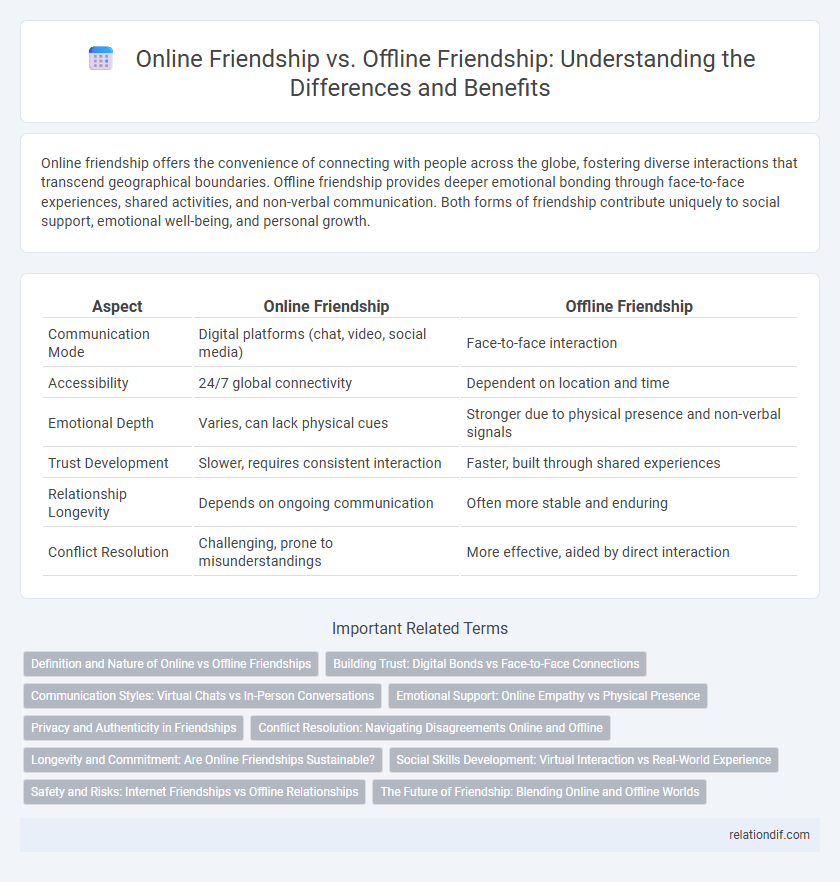Online friendship offers the convenience of connecting with people across the globe, fostering diverse interactions that transcend geographical boundaries. Offline friendship provides deeper emotional bonding through face-to-face experiences, shared activities, and non-verbal communication. Both forms of friendship contribute uniquely to social support, emotional well-being, and personal growth.
Table of Comparison
| Aspect | Online Friendship | Offline Friendship |
|---|---|---|
| Communication Mode | Digital platforms (chat, video, social media) | Face-to-face interaction |
| Accessibility | 24/7 global connectivity | Dependent on location and time |
| Emotional Depth | Varies, can lack physical cues | Stronger due to physical presence and non-verbal signals |
| Trust Development | Slower, requires consistent interaction | Faster, built through shared experiences |
| Relationship Longevity | Depends on ongoing communication | Often more stable and enduring |
| Conflict Resolution | Challenging, prone to misunderstandings | More effective, aided by direct interaction |
Definition and Nature of Online vs Offline Friendships
Online friendships are primarily formed and maintained through digital communication platforms, characterized by text-based interactions that often lack physical presence. Offline friendships involve face-to-face encounters, fostering deeper emotional connections through shared experiences and non-verbal cues. The nature of online friendships emphasizes accessibility and diversity, while offline friendships prioritize intimacy and tangible social bonding.
Building Trust: Digital Bonds vs Face-to-Face Connections
Building trust in online friendships often relies on consistent communication and shared experiences through digital platforms, fostering a sense of reliability despite physical distance. Face-to-face connections, however, benefit from non-verbal cues and immediate feedback, strengthening trust through direct interactions and emotional presence. Both digital bonds and offline friendships require intentional effort and honesty to develop meaningful and lasting trust.
Communication Styles: Virtual Chats vs In-Person Conversations
Online friendships rely on virtual chats that emphasize quick text exchanges, emojis, and multimedia sharing, enabling continuous communication across distances. Offline friendships benefit from in-person conversations rich in nonverbal cues like facial expressions, tone, and body language, fostering deeper emotional connection. The differences in communication styles shape how trust and intimacy develop in digital versus physical social interactions.
Emotional Support: Online Empathy vs Physical Presence
Online friendship provides accessible emotional support through empathetic communication via text, voice, and video, allowing individuals to share feelings instantly regardless of distance. Offline friendship offers the unique advantage of physical presence, which enhances emotional connection through nonverbal cues like touch and body language. The combination of online empathy and offline physical presence creates a comprehensive support system that strengthens bonds and promotes well-being.
Privacy and Authenticity in Friendships
Online friendship offers a unique space for privacy, allowing individuals to share thoughts without physical boundaries, yet it often challenges authenticity due to anonymity and curated online personas. Offline friendship ensures genuine interactions through face-to-face communication, fostering trust and emotional depth difficult to replicate digitally. Balancing privacy with authenticity remains crucial in cultivating meaningful connections across both online and offline friendships.
Conflict Resolution: Navigating Disagreements Online and Offline
Online friendships often rely heavily on written communication, which can lead to misunderstandings due to lack of nonverbal cues, making conflict resolution more challenging. Offline friendships benefit from face-to-face interactions that allow for immediate clarification and emotional expression, facilitating quicker and more empathetic resolutions. Effective conflict resolution in both settings involves active listening, clear communication, and empathy, but offline environments provide richer context for interpreting tone and intent.
Longevity and Commitment: Are Online Friendships Sustainable?
Online friendships can be as sustainable as offline ones when built on consistent communication, mutual trust, and shared experiences, fostering long-term bonds despite physical distance. Commitment in online relationships often hinges on active engagement through digital platforms, which can maintain connection longevity similar to face-to-face interactions. However, offline friendships benefit from regular in-person contact, which naturally reinforces emotional depth and commitment over time.
Social Skills Development: Virtual Interaction vs Real-World Experience
Online friendship offers convenient communication but limits opportunities to develop non-verbal cues and empathy essential for social skills. Offline friendship provides face-to-face interactions that enhance emotional intelligence and conflict resolution through real-time feedback. Balancing virtual and real-world experiences fosters comprehensive social skill development.
Safety and Risks: Internet Friendships vs Offline Relationships
Online friendships offer convenience and global connectivity but carry increased risks such as identity misrepresentation, cyberbullying, and data privacy concerns, requiring vigilant safety measures. Offline friendships benefit from direct social cues and physical interactions, reducing misunderstandings and providing a safer, more tangible support system. Balancing online and offline connections involves recognizing potential dangers in virtual environments while valuing the trust established through face-to-face relationships.
The Future of Friendship: Blending Online and Offline Worlds
The future of friendship is evolving as digital platforms integrate seamlessly with real-world interactions, creating hybrid relationships that combine the convenience of online connections with the depth of offline experiences. Virtual spaces enable people to maintain diverse, global networks while in-person meetings foster stronger emotional bonds and nuanced communication. Advances in augmented reality and social media algorithms will increasingly facilitate this blend, enhancing both the quality and accessibility of friendships across physical and digital boundaries.
online friendship vs offline friendship Infographic

 relationdif.com
relationdif.com